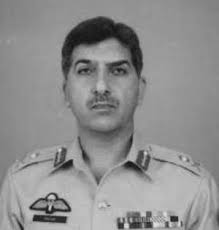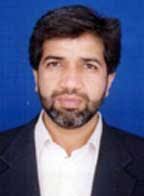Prisoners of a jihadi past
By Syed Irfan Ashraf & Faizullah JanTuesday, 24 Feb, 2009



![[aslam.jpg]](http://www.newageislam.com/controlpanel/picture_library/aslam.jpg)

![[Gen_Hamid_Gul.jpg]](http://www.newageislam.com/controlpanel/picture_library/Gen_Hamid_Gul.jpg)











Yeh fasl-i-gul keh jise nafroton ne seencha hay/ Agar phalee to shararon kay phool lai gee/ Na phal sakee to nai fasl-i-gul kay aane tak/ Zameer-i-arz may ik zehr ghol jai gee
— Sahir Ludhianvi
(This crop that has been sown with hatred/ If it grows, it will bloom flowers of fire/ If it fails to grow, till the sowing of a new crop/ It will make the heart of the soil poisonous.)
OVER a dozen militant groups of diverse geographical backgrounds are united in their aim to bring down state and society in Pakistan.
Unfortunately, the impression one gets from the corridors of power is that the wielders of authority have been completely nonplussed.
Distressingly, the issue is oversimplified as the theory is propagated of the involvement of a foreign hand in fomenting militancy in Pakistan. Does this oversimplification serve any purpose?
When President Asif Ali Zardari talked to an American television channel some time ago, he probably did not know how close he was to the truth about the insurgency in large swathes of the country. But still he fell short of completing the picture of the monster that has been eating into the vitals of Pakistan. “We have weaknesses and they [the Taliban] are taking advantage of that weakness,” Zardari told CBS in an interview. What are the weaknesses? How and who reared them in our backyard while the whole state apparatus looked the other way? These questions demand clear answers; mere half-confessions will lead us nowhere.
Some circles say that a small but well-entrenched part of the Pakistani establishment still looks upon the Mujahideen and their Taliban successors as Pakistan’s protectors. Consciously or subconsciously, they defend them as a strategic asset. These elements are remnants of the legacy of their Afghan war mentors — the very people who dreamt of gaining strategic depth in Afghanistan through a leadership like the Taliban’s to counter perceived Indian hegemony in the region and defend the western border against danger.
Former federal minister Sheikh Rashid on a visit to Peshawar last year admitted that he would not object to the Taliban if they brought with them a viable system of governance. Prisoners of their own jihadi past, many retired civil servants and military officials enjoyed a monopoly over security issues and are now constantly being invited to talk shows and seminars to impose their analysis in which their support for the militants’ standpoint is implicit.
A sordid tale to illustrate this point follows. During a heated debate on the Fata situation at the Area Study Centre of the University of Peshawar, former ISI head Gen (retd) Asad Durrani, after being cornered by discussants, suddenly said: “Leave all this discussion, let me ask the audience whether they want the Taliban to win or the US? Just raise your hand.” His words created a ruckus with many taken aback.
The root of the problem lies in the past when a network of intelligence agencies was set up to indoctrinate young and old alike during the days of the Afghan jihad. Lured by Saudi riyals, Kuwaiti dinars and US dollars, jihadists were brought in from all corners of the world to be trained physically and psychologically. Political leaders of religious parties prospered through contacts with state and non-state elements. Rubbing shoulders with mighty generals, jihad for them became an enterprise. Hence small evils were assembled to raise a jihadi industry aimed at the larger evil, the USSR.
Little did elements in the Pakistani establishment realise that while their efforts could win them the Afghan war, the frenzy of jihad would be directed elsewhere once the struggle against the Soviet Union was over. Pakistan’s civil and military establishment had opened ‘industries of indoctrination’ to produce jihadis at a mass level in order to achieve what it saw as strategic depth in Afghanistan. However, when the jihad in Afghanistan was nearing its end, many in the civil and military establishment had become more jihadist than the products of their policy. A new twist was given to the philosophy of ‘charity begins at home’ as jihadis and their ideologues turned on Pakistan whose government in their view was too pro-US and civil society too western in its outlook.
Today, the USSR does not exist anymore but jihadi elements have permeated the state apparatus and society in Pakistan to such an extent that they are now an integral part of them. A spirited jihadi school of thought has a strong influence on every sphere of life including the media and mainstream political parties. As the late Benazir Bhutto said, society has been “de-intellectualised”, with dissenting voices being silenced and the more outspoken being chased away.
It is also in this situation that indoctrination and education have become entangled. There appears to be no difference between students of universities and madressahs. Both churn out militancy-minded individuals. It is difficult to tell the mentor from the protégé because the process of indoctrination affects not only the target group but also the indoctrinators.
This complication is further weakening the resolve of anti-militant forces. In primitive societies,
warriors would never be allowed to interact with civil society without going through a series of rituals at a distance from the population. The wisdom in this was that they had shed blood and their war frenzy needed to be toned down lest they went berserk and behaved violently in their own settlements.
Today, Pakistan is suffering from the same malaise. Jihad became the profession and identity of the warriors of the Afghan jihad, but at the end of the day they were expected to shed their identity and become normal citizens. Just like detoxified drug addicts, these jihadis need to go through a process of reformation and reorientation.
There is an obvious need for a paradigm shift at the strategy level to quell the insurgency, especially in the light of the understanding that it is not a war against militants but a protracted crusade against militancy. Militants can eventually be eliminated through military means, but right now the state requires fighting a mindset that is weakening it from within. Only then can it wage a successful war against militancy. (Dawn)





















3 comments:
f>>k dem aaalllllllllll
mullah+military is a curse for dear Pakistan
Pakistan i think don,t have weaknesses it have the problem of ignorance because when terrorist found that there is no strict rule in Pakistan so they get benefit of that.
Sheraton Karachi
Post a Comment
1. You are very welcome to comment, more so if you do not agree with the opinion expressed through this post.
2. If you wish to hide your identity, post with a pseudonym but don't select the 'anonymous' option.
3. Copying the text of your comment may save you the trouble of re-writing if there is an error in posting.